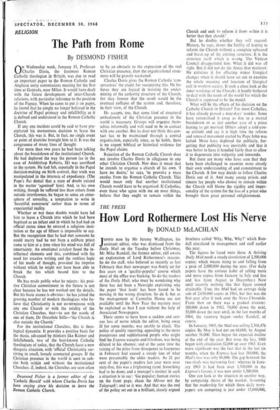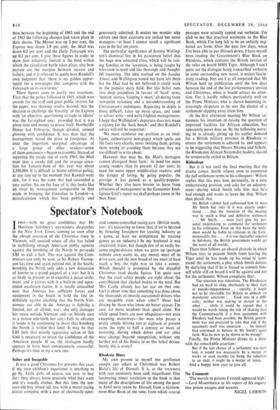How Lord Rothermere Lost His Nerve
THE PRESS
By DONALD McLACHLAN
JOINED now by Mr Jeremy Wallington, his assistant editor, who was dismissed from the Daily Mail on the Tuesday before Christmas, Mr Mike Randall, the former editor, still awaits an explanation of Lord Rothermere's reasons. So do the staff, who believed as recently as last February that their newspaper was firmly set for five years on a `quality-popular' course which most of the office was backing. So do'the readers of the Daily Mail, who must be wondering why there has not been a Newsight explaining why the paper 'that leads' has been found to be moving in the wrong direction. So do I; but as the management at Carmelite House are not available until the New Year the mystery must be explained as best I can without the help of Associated Newspapers.
There seems to have been a sudden and seri- ous loss of nerve which the editor, being away ill for some months, was unable to check. The policy of quality reporting, appealing to the more prosperous and sophisticated people who might find the Express escapist and frivolous, was being diluted in his absence; and at the same time the raising of the price from threepence to fourpence in February had caused a steady loss of what were presumably the older readers. As 21 per cent of the paper's readers last year were over sixty-five, this was a frightening trend. Something had to be done; and a manager's instinct in such a situation is to say: `Go popular; human stories on the front page; chase- the Mirror not the Telegraph'; and so it was. And that was the end of the policy set out in a brilliant, closely argued brochure called 'Why, Why, Why?' which Ran- dall circulated to management and staff earlier this year.
The figures he faced were these. A thriving Daily Mail needs a steady circulation of 2,500,000 copies; which means rising to and falling from a peak of 2,600,000 during the year. (For daily papers have the curious habit of selling more and more copies from January to July and less and less from August to December.) Now until recently nothing like that figure seemed attainable. True, the Mail had an average daily sale of 2,650,000 copies in 1961, but that was the first year after it took over the News Chronicle. From then on there was a gradual erosion: 100,000 down in 1962, 74,000 down the next,. 55,000 down the next until, in the last months of 1964, the recovery began—under Randall, of course.
In January, 1965, the Mail was selling 2,368,476 copies. By May it had put on 68,000; by August another 56,000. Then began the expected decline at the end of the year. But none the less, 1966 began with circulation 52,000 up over 1965. Even more significant was the fact that in the last six months, when the Express had lost 380,000, the Mail's loss was only 86,000. The gap between the two rivals was narrowing fast : whereas in Janu- ary 1963 it had been over 1,700,000 in the Express's favour, it was now under 1,500,000.
One can look at the situation in another way, by comparing shares of the market. Assuming that the readership for which these daily news- papers are competing is just under 15,000,000,
then between the beginning of 1963 and the end of 1965 the following changes had taken place in their shares. The Mirror was up 3 per cent, the Express was down 1.9 per cent; the Mail was down 0.3 per cent and the Daily Telegraph was up 0.2 per cent. I give these figures in order to show how relatively limi:ed is the field within which the circulation battle takes place, also how narrow are the margins between success and failure; and it is relevant to quote here Randall's own judgment that 'there is no golden oppor- tunity for a newspaper that competes with the Telegraph on its own terms.'
These figures seem to justify two assertions. First, that the policy followed in 1965, which won awards for the staff and great public interest for the paper, was showing results. Second, that the decision to challenge the 'frivolity' of the Express with 'an objective, questioning attitude to affairs' was the far-sighted one : provided that it was given time and money to prove itself. Northcliffe House last February, though divided, seemed glowing with confidence. It was then that the management raised the price to fourpence. At once the important marginal advantage of a large group of older readers—some of them pensioners—began to crumble. Instead of repeating the steady rise of early 1965, the Mail went into a steady fall and the average circu- lion for January-June of this year was about 2,380,000. It is difficult to blame editorial policy, at any rate up to the moment that Randall went sick, for it was the same that had succeeded a year earlier. So, on the face of it, this looks like an error by management comparable to that made in bringing the Guardian to London—a miscalculation which has been publicly and
generously admitted. It makes me wonder why editors and their assistants are sacked but never managers—at least I cannot recall a significant case in the last ten years.
The particular significance of Jeremy. Walling- ton's dismissal lies in his passionate belief that the huge new educated class, which will be rais- ing families in the 'seventies, is being taught by television to need and like thorough and thought- ful reporting. The idea worked on the Sunday Times, and Wallington would not have left there for the Mail had he not believed it could work in the popular daily field. But this belief runs into deep prejudices in favour of 'hard' news, 'human' stories, 'keeping it short,' all dating from newsprint rationing and a misunderstanding of Christiansen's techniques. Reporting in depth is more difficult, takes up more space, and tends to attract writs—and writs frighten managements. I hope that Wallington's departure does not mean a victory for the 'back bench,' and that Randall's advice will still be respected : 'We must reinforce our position as an intel- ligent, authoritative newspaper which spells out the facts very clearly, never twisting them, getting them wrong or avoiding them because they are too difficult to write about.- However that may be, the Mail's managers cannot disregard three facts : its need for more young readers than its present 12 per cent; its need for more upper middle-class readers; and the danger of losing, by going popular, the prestige it has gained as a quality-popular. Whether they also have lessons to learn from criticisms of management in the Economist Intel- ligence Unit's report we shall perhaps know in the New Year.







































 Previous page
Previous page